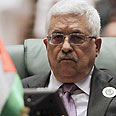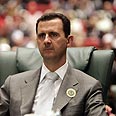

Syria and Libya teamed up Sunday to pressure the Palestinian leader to quit peace talks with Israel and return to violence, delegates to an Arab leadership summit said.
An adviser to the US-backed Palestinian president, Mahmoud Abbas, quickly rejected the suggestion, calling for the 22 nations represented at the gathering in Sirte, Libya, to be "realistic." Despite the opposition from two of Israel's longtime foes, the summit was expected Sunday to renew backing for Palestinian peace talks with Israel.
Still, the calls to abandon the effort reflected the depth of frustration and anger over the stalled process and continued Israeli construction in areas claimed by the Palestinians, particularly east Jerusalem.
Syrian President Bashar Assad urged Abbas to withdraw from a US-supported peace strategy and resume armed resistance to Israel, according to two delegates who spoke on condition of anonymity because of the sensitivity of the issue.
They said Assad also urged Arab countries to halt any contacts with Israel, though only Egypt and Jordan have peace deals with the Jewish state.
"The price of resistance is not higher than the price of peace," one delegate quoted Assad as telling Abbas.
Summit host Moammar Gaddafi of Libya warned that his nation will withdraw support for an initiative launched at a 2002 Arab League summit in Beirut calling for exchanging land for peace with Israel, the delegates said.
Senior Abbas aide Nabil Abu Rdeneh dismissed the pressure.
"Let us be realistic. We will not follow those who have special agendas," he told Al-Jazeera television.
"We are ready for any Arab option. If they want to go to war let them declare that and mobilize their armies and their people and we will follow suit," Abu Rdeneh said.
Earlier this month, Arab nations opened the door for Abbas to enter four months of indirect, American-brokered peace talks with Israel. But they later threatened to withdraw support for the negotiations after Israel announced plans for new Jewish homes in east Jerusalem, the part of the city Palestinians claim as the capital of a future state.
'Reject any Israeli excuses'
Speaking at the summit Saturday, Abbas urged Mideast peace brokers to push Israel to stop settlement construction, and he vowed that the Palestinians will not sign any peace deal with Israel without the Jewish state ending its "occupation" of east Jerusalem.
He accused Israeli Prime Minster Benjamin Netanyahu's government of trying to create a de facto situation in Jerusalem that would torpedo any future peace settlement.
The Palestinians are also asking Arab nations for millions of dollars in funding for Palestinians living in east Jerusalem.
Arab League chief Amr Moussa urged leaders at the opening of the summit to create a new strategy to pressure Israel and stressed the peace process cannot be "open ended."
During the summit Arab leaders failed to reach a consensus on whether the Palestinians should resume stalled talks with Israel.
The Arab League had given its blessing to the Palestinians, before the Israeli decision was announced, to conduct the so-called proximity talks with Israel, so the organization's stance now on whether those negotiations should still go ahead is potentially decisive.
The committee of foreign ministers from some member states produced a resolution saying that a halt to all settlement activity was necessary for Israeli-Palestinian negotiations to go ahead.
But that decision was not adopted by the full summit and, in a sign of the lack of consensus, Syria's foreign minister said his country would not recognize the document as representing the view of the Arab League.
Moussa said after the summit ended that another, extraordinary meeting of heads of state would take place at an unspecified date later in the year to deal with outstanding issues.
He acknowledged the urgency of taking a collective decision on the Israeli-Palestinian talks.
"Within the next few weeks we have to decide what to do: whether to continue with the negotiations or to completely shift course," he told a news conference.
In the summit's closing statement, Moussa said, "The resumption of negotiations requires a complete halt to the construction of Israeli settlements in the occupied Palestinian territories, including east Jerusalem.
"The Arab leaders stress their commitment to the Arab stance according to which the renewal off Israeli-Palestinian talks requires that Israel lives up to its obligations. They (leaders) reject any Israeli excuses and justifications to continue the illegitimate settlement activity," read the closing statement.
The Arab leaders also urged the Mideast Quartet, which is comprised of the UN, US, EU and Russia, to "reject Israeli excuses for the continuation of settlement construction and the acts of aggression in Jerusalem aimed at Judaizing the city."
Moussa added that "the ball is in Israel's court with regards to the peace process." Addressing the Israeli government, he said, "If you're serious – we're serious."















